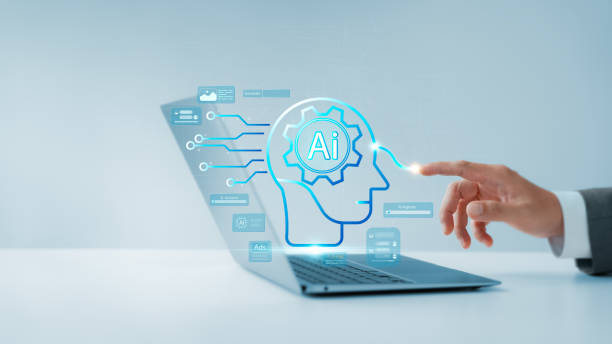What is Artificial Intelligence? Key Definitions and Concepts

What is Artificial Intelligence? Key Definitions and Concepts
#ArtificialIntelligence (AI) is a branch of computer science dedicated to building machines capable of performing tasks that typically require human intelligence.
These tasks include learning, reasoning, problem-solving, natural language understanding, pattern recognition, and perception.
In essence, the goal of #ArtificialIntelligence is to create systems that can think and act like humans.
Various definitions of artificial intelligence have been offered.
A simple definition is that artificial intelligence refers to the ability of a system to mimic intelligent behavior.
A more comprehensive definition defines artificial intelligence as the study and design of intelligent agents.
An intelligent agent is a system that perceives its environment and takes actions to achieve its goals.
Some areas of artificial intelligence include machine learning, neural networks, natural language processing, and computer vision.
Artificial Intelligence (AI) is used in a wide range of industries and applications.
These applications include:
- Automotive: Self-driving cars are a prominent example of the application of artificial intelligence in this industry.
- Healthcare: Disease diagnosis, drug development, and personalized care.
- Financial Services: Fraud detection, risk management, and financial advisory services.
- Retail: Product recommendations, price optimization, and intelligent customer service.
- Manufacturing: Automation of production lines, quality control, and supply chain optimization.
Currently, artificial intelligence plays a very important role in our lives, and its impact is increasing day by day.
Did you know that a weak company website loses you many opportunities daily? Solve this problem forever with a professional corporate website design by Rasaweb!
✅ Create a powerful and trustworthy image of your brand
✅ Attract new targeted customers and increase sales
⚡ [Get Free Website Design Consultation]
The History of Artificial Intelligence from the Beginning to Today

The History of Artificial Intelligence from the Beginning to Today
The history of Artificial Intelligence (AI) dates back to the 1950s when scientists and researchers first began exploring the possibility of building machines that could think.
The Dartmouth Conference in 1956 is often recognized as the starting point of this field.
At this conference, the term “artificial intelligence” was first coined, and the initial goals and visions of the field were defined.
[Link to Wikipedia](https://fa.wikipedia.org/wiki/%D9%87%D9%88%D8%B4_%D9%85%D8%B5%D9%86%D9%88%D8%B9%DB%8C)
The 1960s and 1970s witnessed early advances in artificial intelligence.
Programs like ELIZA and SHRDLU were able to perform limited language interactions.
However, this early period also faced serious limitations, including a lack of processing power and sufficient data to train systems.
The 1980s marked a new era in artificial intelligence with the emergence of expert systems.
Expert systems were programs that incorporated specialized knowledge in a specific field and could answer questions and provide recommendations.
However, expert systems also faced problems such as high development and maintenance costs.
In the 1990s and 2000s, with significant advances in hardware and software, Artificial Intelligence (AI) witnessed significant growth and development.
The emergence of the Internet and increased access to data enabled the development of more complex algorithms and the training of larger models.
During this period, algorithms such as Machine Learning and Neural Networks were widely used.
Today, Artificial Intelligence (AI) is transforming and has a profound impact on our lives.
Machine Learning is a Subset of Artificial Intelligence

Machine Learning is a Subset of Artificial Intelligence
Machine Learning is a branch of Artificial Intelligence (AI) that allows systems to learn from data and improve their performance without explicit programming.
In other words, instead of giving systems step-by-step instructions, machine learning algorithms identify patterns and relationships in the data and make decisions based on them.
There are different types of machine learning algorithms, including:
- Supervised Learning: In this type of learning, the algorithm is trained using labeled data.
Labeled data includes inputs and desired outputs.
The goal is to learn a function that can predict the correct output for new inputs. - Unsupervised Learning: In this type of learning, the algorithm is trained using unlabeled data.
The goal is to find hidden patterns and structures in the data.
Clustering and Dimensionality Reduction are among the unsupervised learning techniques. - Reinforcement Learning: In this type of learning, an agent is placed in an environment and learns how to best act by performing various actions and receiving rewards or penalties.
Machine Learning is used in many fields, including face recognition, fraud detection, product recommendation, machine translation, and autonomous driving.
In fact, wherever there is a lot of data and a need to extract patterns and relationships from it, machine learning can be helpful.
| Learning Type | Description | Applications |
|---|---|---|
| Supervised Learning | Training with labeled data | Face recognition, spam email detection |
| Unsupervised Learning | Training with unlabeled data | Customer clustering, data dimensionality reduction |
| Reinforcement Learning | Learning through rewards and penalties | Games, autonomous driving |
Neural Networks and Deep Learning

Neural Networks and Deep Learning
Neural Networks are computational models inspired by the structure and function of the human brain.
A neural network consists of a large number of nodes (neurons) that are interconnected in a layered fashion.
Each connection between two nodes has a weight that indicates the strength of the connection between those two nodes.
Neural networks adjust their weights using learning algorithms to learn patterns and relationships in the data.
Deep Learning is a type of Machine Learning that uses deep neural networks (networks with many layers).
Deep neural networks are capable of learning more complex and abstract features from data.
For this reason, deep learning has achieved very good results in many areas such as computer vision, natural language processing, and speech recognition.
Neural Networks and Deep Learning have applications in various fields:
- Computer Vision: Object recognition, face recognition, handwriting recognition
- Natural Language Processing: Machine translation, text summarization, question answering
- Speech Recognition: Speech-to-text conversion, sound recognition
- Games: Chess, Go, video games
- Self-Driving Cars: Traffic sign recognition, obstacle detection
In short, neural networks and deep learning are powerful tools that can be used to solve complex problems in various fields.
How much does losing business leads due to an unprofessional website cost you? Solve this problem forever with a professional corporate website design by Rasaweb!
✅ Increase the credibility and trust of potential customers
✅ Easier attraction of new business leads
⚡ Get free consultation now!
Applications of Artificial Intelligence in Various Industries

Applications of Artificial Intelligence in Various Industries
Artificial Intelligence (AI) is transforming various industries, and its applications are expanding day by day.
In this section, we will examine the applications of Artificial Intelligence (AI) in a few key industries
- Healthcare: Artificial Intelligence (AI) is used in disease diagnosis, drug development, personalized care, and hospital management.
For example, machine learning algorithms can analyze medical images and detect diseases like cancer in their early stages. - Financial Services: Artificial Intelligence (AI) is used in fraud detection, risk management, financial advisory services, and automation of banking processes.
For example, Artificial Intelligence (AI) systems can monitor banking transactions in real-time and identify suspicious transactions. - Retail: Artificial Intelligence (AI) is used in product recommendations, price optimization, intelligent customer service, and supply chain management.
For example, recommender systems can suggest suitable products to customers based on their purchase history and behavior. - Manufacturing: Artificial Intelligence (AI) is used in automating production lines, quality control, predicting equipment failures, and optimizing the supply chain.
For example, intelligent robots can perform repetitive and dangerous tasks on production lines. - Transportation: Artificial Intelligence (AI) is used in self-driving cars, route optimization, traffic management, and demand forecasting.
For example, self-driving cars can understand their surroundings and drive safely using sensors and Artificial Intelligence (AI) algorithms.
Advantages and Disadvantages of Artificial Intelligence

Advantages and Disadvantages of Artificial Intelligence
Artificial Intelligence (AI) has many advantages, but it also has disadvantages that should be considered.
Some of the most important advantages of Artificial Intelligence (AI) include
- Increased Efficiency and Productivity: Artificial Intelligence (AI) can automate various processes and increase the speed of task completion.
- Error Reduction: Artificial Intelligence (AI) systems can operate more accurately than humans and reduce the likelihood of errors.
- Improved Decision-Making: Artificial Intelligence (AI) can extract valuable information by analyzing large amounts of data and help make better decisions.
- Cost Reduction: Artificial Intelligence (AI) can reduce costs by automating processes and reducing the need for human labor.
- Creation of New Opportunities: Artificial Intelligence (AI) can create new opportunities in various fields and contribute to innovation.
In addition to its advantages, Artificial Intelligence (AI) also has disadvantages:
- High Development and Implementation Costs: Developing and implementing Artificial Intelligence (AI) systems can be very expensive.
- Need for Expertise and Skills: Developing and using Artificial Intelligence (AI) systems requires specific expertise and skills.
- Ethical Concerns: Artificial Intelligence (AI) can raise various ethical concerns, such as discrimination, privacy, and accountability.
- Impact on Employment: Artificial Intelligence (AI) can lead to the loss of some jobs, especially those that are repetitive and routine.
- Data Dependency: Artificial Intelligence (AI) systems need a lot of data to learn and function correctly.
The Future of Artificial Intelligence and Prospects

The Future of Artificial Intelligence and Prospects
The future of Artificial Intelligence (AI) is very bright and full of potential.
Artificial Intelligence (AI) is expected to play an increasingly important role in our lives in the coming years and transform various industries.
Some of the most important future trends in the field of Artificial Intelligence (AI) include:
- Artificial General Intelligence (AGI): The goal of Artificial General Intelligence is to build systems that can perform any intellectual task that a human can perform.
AGI is still in the early stages of development, but it has the potential to create enormous transformations. - Explainable AI (XAI): The goal of Explainable AI is to build systems that can explain how they make decisions.
This is very important for increasing trust in Artificial Intelligence (AI) systems and ensuring that they are fair. - Edge AI: Edge AI refers to running Artificial Intelligence (AI) algorithms on local devices, such as mobile phones and cameras.
This can reduce latency, increase privacy, and reduce dependence on the Internet. - Ethical AI: Ethical AI refers to the development and use of Artificial Intelligence (AI) in a responsible and fair manner.
This includes paying attention to issues such as discrimination, privacy, and accountability.
In general, the future of Artificial Intelligence (AI) is very exciting and has the potential to create positive transformations in our lives.
However, we must also pay attention to the potential challenges and risks and ensure the responsible development and use of Artificial Intelligence (AI).
Artificial Intelligence in Iran: Current Situation and Challenges

Artificial Intelligence in Iran: Current Situation and Challenges
Artificial Intelligence (AI) in Iran, like in other parts of the world, is considered an important and strategic technology.
In recent years, many efforts have been made to develop Artificial Intelligence (AI) in Iran, but there are still many challenges.
Current Situation of Artificial Intelligence (AI) in Iran:
- Research and Development: Numerous universities and research centers in Iran are active in the field of Artificial Intelligence (AI) and publish many scientific articles in this field.
- Startups: A large number of startups in Iran are active in the field of Artificial Intelligence (AI) and offer various products and services.
- Use in Industries: Artificial Intelligence (AI) is used in some industries in Iran, such as healthcare, financial services, and manufacturing.
Challenges of Artificial Intelligence (AI) in Iran:
- Shortage of Specialists: One of the most important challenges of Artificial Intelligence (AI) in Iran is the shortage of skilled and experienced specialists.
- Lack of Data: To develop efficient Artificial Intelligence (AI) systems, a lot of data is needed, which is not easily available in Iran.
- Lack of Investment: Investment in the field of Artificial Intelligence (AI) in Iran is still insufficient.
- Infrastructure Limitations: Infrastructure limitations, such as low internet speed and lack of computing resources, can hinder the development of Artificial Intelligence (AI) in Iran.
- Legal and Regulatory Barriers: Laws and regulations related to Artificial Intelligence (AI) have not yet been fully developed in Iran.
| Indicator | Status |
|---|---|
| Specialists | Shortage |
| Data | Limited Access |
| Investment | Insufficient |
| Infrastructure | Limitations |
Did you know that poor online store design can drive away up to 70% of your potential customers? Rasaweb transforms your sales with professional and user-friendly e-commerce website designs.
✅ Significant increase in sales and revenue
✅ Fully optimized for search engines and mobile
⚡ [Get free consultation from Rasaweb]
How to Learn Artificial Intelligence: Resources and Guidance

How to Learn Artificial Intelligence: Resources and Guidance
Learning Artificial Intelligence (AI) can be a challenging process, but by using the right resources and planning, you can make progress in this area.
In this section, we introduce resources and guidance for learning Artificial Intelligence (AI)
Online Resources:
- Online Courses: Many websites offer online courses in the field of Artificial Intelligence (AI), such as Coursera, edX, Udacity, and Khan Academy.
These courses can be a good starting point for learning the basic concepts of Artificial Intelligence (AI). - Video Tutorials: YouTube and Aparat are full of video tutorials in the field of Artificial Intelligence (AI).
These tutorials can help you learn the practical concepts and techniques of Artificial Intelligence (AI). - Articles and Blogs: Many websites publish articles and blogs in the field of Artificial Intelligence (AI).
Reading these articles and blogs can help you stay up-to-date with the latest developments in Artificial Intelligence (AI).
Books:
- Textbooks: There are many textbooks in the field of Artificial Intelligence (AI) that can help you learn the basic and advanced concepts of Artificial Intelligence (AI).
- Guidebooks: There are many guidebooks in the field of Artificial Intelligence (AI) that can help you learn the practical techniques of Artificial Intelligence (AI).
Guidance:
- Choose a Programming Language: To learn Artificial Intelligence (AI), you need to learn a programming language.
Python is one of the most popular programming languages for Artificial Intelligence (AI). - Practical Practice: To learn Artificial Intelligence (AI), you need to do a lot of practical practice.
Try to do small and simple projects in the field of Artificial Intelligence (AI). - Participate in Events: Participate in Artificial Intelligence (AI) events, such as conferences and workshops.
These events can help you network with other Artificial Intelligence (AI) professionals and learn from them.
The Impact of Artificial Intelligence on the Future of Jobs

The Impact of Artificial Intelligence on the Future of Jobs
Artificial Intelligence (AI) is increasingly transforming the labor market and will have a profound impact on the future of jobs.
Some jobs will be lost due to automation, while new jobs will be created that require new skills.
This [link to a news article](https://www.isna.ir/news/1403030502346/%DA%AF%D8%B2%D8%A7%D8%B1%D8%B4-%D9%85%D8%B9%D8%A7%D9%88%D9%86%D8%AA-%D9%87%D9%88%D8%B4-%D9%85%D8%B5%D9%86%D9%88%D8%B9%DB%8C-%D9%88-%D8%A8%D8%A7%D8%B2%D8%A7%D8%B1-%DA%A9%D8%A7%D8%B1-%D8%AF%D8%B1-%D8%A7%DB%8C%D8%B1%D8%A7%D9%86-%DA%86%DB%8C%D8%B3%D8%AA) can help you in this regard.
Jobs at Risk:
- Repetitive and Routine Jobs: Jobs that involve repetitive and routine tasks, such as data entry, order processing, and basic customer service, are most at risk of automation.
- Low-Skilled Jobs: Jobs that require low skills, such as production line workers and drivers, are also at risk of automation.
Jobs for Which Demand Will Increase:
- Artificial Intelligence (AI) Specialists: Demand for Artificial Intelligence (AI) specialists, such as data scientists, machine learning engineers, and Artificial Intelligence (AI) developers, will increase sharply.
- Jobs Requiring Soft Skills: Jobs that require soft skills, such as critical thinking, problem-solving, creativity, and communication, will be more resistant to automation.
- New Jobs: Artificial Intelligence (AI) will also create new jobs that do not exist today.
How to Prepare for the Future of Work:
- Learn New Skills: Learn new skills that will be needed in the future labor market, such as skills related to Artificial Intelligence (AI), soft skills, and digital skills.
- Stay Up-to-Date: Stay up-to-date with the latest developments in the field of Artificial Intelligence (AI) and its impact on the labor market.
- Be Flexible: Be flexible to change jobs and learn new skills.
FAQ
| Question | Answer |
|---|---|
| 1. What is Artificial Intelligence (AI)? | It is a branch of computer science that aims to create machines capable of mimicking human intelligence and performing tasks that require human thinking, such as learning, problem-solving, and decision-making. |
| 2. What are the main types of artificial intelligence? | They can be classified into weak artificial intelligence (Narrow AI) that focuses on a specific task, general artificial intelligence (General AI) that has comprehensive human capabilities, and super artificial intelligence (Super AI) that exceeds human intelligence. |
| 3. Mention some common applications of artificial intelligence in our daily lives. | These include voice assistants (such as Siri and Alexa), recommendation systems (such as Netflix and Amazon), self-driving cars, facial recognition systems, and spam filters. |
| 4. What is the difference between Artificial Intelligence and Machine Learning? | Artificial intelligence is the broader concept of creating intelligent machines, while machine learning is a subset of artificial intelligence that focuses on enabling systems to learn from data without explicit programming. |
| 5. What is Deep Learning? | It is a subset of machine learning that uses multi-layered artificial neural networks (deep neural networks) to process data and discover complex patterns, and is used in image and speech recognition. |
| 6. What are the most prominent benefits of artificial intelligence? | Improving efficiency and productivity, automating repetitive tasks, making better decisions based on big data analysis, and developing solutions to complex problems in fields such as medicine and science. |
| 7. What are the main challenges facing the development and deployment of artificial intelligence? | These include the need for massive amounts of high-quality data, privacy and security issues, bias in data and algorithms, and high development and maintenance costs. |
| 8. Does artificial intelligence raise ethical or social concerns? | Yes, it raises concerns related to privacy, algorithmic bias, job loss due to automation, and responsibility for errors made by intelligent systems, and the need for a regulatory framework. |
| 9. How can artificial intelligence affect the future of the labor market? | It can lead to the automation of some routine jobs, but it will also create new jobs that require advanced skills in developing, operating and maintaining artificial intelligence systems. |
| 10. What are some modern or promising technologies in the field of artificial intelligence? | These include advanced natural language processing (NLP) (such as large language models such as ChatGPT), computer vision, robotics, and generative AI. |
And other Rasaweb advertising agency services in the field of advertising
Intelligent content strategy: A special service to increase the click-through rate based on user experience customization.
Smart marketplace: An effective tool for user interaction with attractive user interface design.
Intelligent link building: A special service to increase the click-through rate based on user experience customization.
Smart direct marketing: An effective tool to attract customers with Google Ads management.
Intelligent custom software: Professional optimization for analyzing customer behavior using attractive user interface design.
And more than a hundred other services in the field of internet advertising, advertising consulting and organizational solutions
Internet Advertising | Advertising Strategy | Advertorial
Resources
What is Artificial Intelligence?
,Definition of Artificial Intelligence
,What is Artificial Intelligence and What are its Applications?
,Artificial Intelligence at Gartner
? Are you looking for a digital transformation for your business? Rasaweb Digital Marketing Agency paves the way for your growth by providing services such as professional website design, SEO, and social media management. Trust us to make your online presence shine and take your business to the peak of success.
📍 Tehran, Mirdamad Street, next to the Central Bank, South Kazerun Alley, Ramin Alley No. 6




